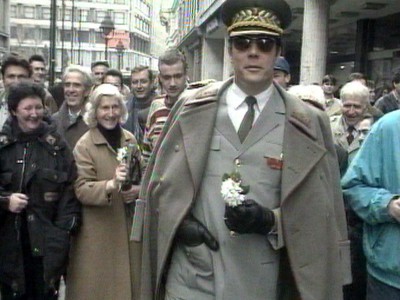
Marble Ass
Tito Among the Serbs for the Second Time
"One of the heroes of the war responds by inverting gender roles, others respond to violence with violence." – Zelimir Zilnik
Marble Ass conveys Zilnik's criticism of the militant attitude and patriarchal features of Milosevic’s system in the 1990s, while depicting the catastrophe through the fringes of society in Belgrade. This is the first work in Serbian queer cinema, featuring two transgender prostitutes, Merlin and Sanela, who turn tricks with Serbian men. In the desolate atmosphere of war, destruction and omnipotent violence, Merlin and Sanela comfort the clients with physical affection. Marble Ass is Zilnik's call to pacifism and is a study in finding different ways of solving inner conflicts.
"I wanted to confront people with their past." – Zelmir Zilnik
It is Belgrade in 1994. A man dressed in Marshal Tito’s uniform appears and, instantly, groups of people flock around him. In Tito A mong the Serbs for the Second Time, Zilnik brings the former Yugoslavian dictator back among the people in the streets of Belgrade so he may see how his people are now living without him. Tito’s double wanders around the city and procures remarkable reactions as people gather speak to him, feeling the need to formulate their destinies.
Zilnik collects statements from a cross section of Serbian society, revealing its attitude toward the past and the current government. The picture he creates is complex. He presents a diversity of attitudes and moods, often punctuating the dominant story with comical scenes and, also, moments of tragedy, such as in talks with refugees from Bosnia or with soldiers who have returned from the front. The filmmaker shows people who have grown accustomed to their lack of freedom, to their leader, to swift and zealous conversions to other ideologies and events, without ever finding time to comprehend and digest their own attitudes. As Zilnik says, "And then, once the leader is gone, we malign him. The past disappears, is never rationally appraised. It becomes a big black hole, a taboo, a gap in our identity. And taboos lead to repression and the savagery in Bosnia."


















